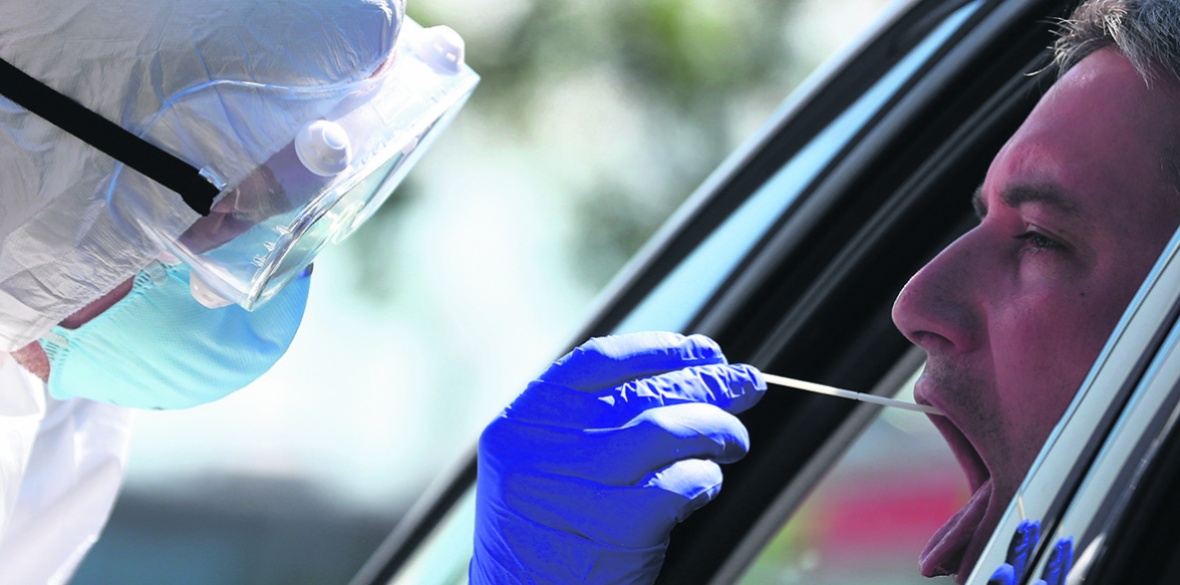This is the last article you can read this month
You can read more article this month
You can read more articles this month
Sorry your limit is up for this month
Reset on:
Please help support the Morning Star by subscribing here
IN JULY Serco announced Dame Sue Owen, formerly a top civil servant, is becoming one of its non-executive directors. Dame Sue was permanent secretary for the Department for Culture, Media and Sport until April 2019. That made her the most senior civil servant in the department, although it isn’t a department particularly relevant to Serco’s government business.
However, Dame Sue has had a long career in government with many other Serco-relevant positions: she was a Department for Work and Pensions director-general from 2013-19 and had senior positions in the Treasury before that.
Serco itself told investors Dame Sue “has held senior positions in several government departments.”
The chairman of Serco, Sir Roy Gardner, gave the game away in his announcement to the Stock Exchange.
Sir Roy said: “I am very pleased to welcome Sue to the board of Serco. She has deep experience of government and government policy.”
Which to my mind shows the essentially parasitic nature of Serco’s strategy: Serco is a leading privatiser. The supposed logic of privatisation is that it brings dynamic market innovations to bear on government activity. So why appoint somebody with “deep experience of government policy?”
The government has all the experience of government policy it needs. It’s not something it is short of. In theory Serco is supposed to be supplying the private-sector pizzazz: but in practice it is just hiring insiders to help it win more government work.
That’s why Serco already appointed Rupert Soames as its chief executive. He’s a man with an undistinguished business career, but he is a grandson of Churchill, a brother-in-law of Tory MP Phillip Dunne and a man who used to do the disco at top people’s club Annabel’s. Now it has Dame Sue on the board as well.
Serco needs “insiders” because its actual work has so often proved to be merely cost-cutting and not at all good.
Across the world, public health authorities are running “contact tracing” using health professionals and to chase down the coronavirus. But in Britain — uniquely, as far as I can tell — we have contracted out contact tracing to low-wage, unskilled call centre staff under a contract with Serco.
It’s not going well. But that is no surprise. Serco’s involvement in health services — like its much-criticised contract to provide night GP cover in Cornwall, where the firm was heavily criticised for failing to meet national standards, falsifying data and a “bullying culture” — is not good.
What is a surprise is that the government gave a key contract to a firm that was fined £23 million for faking results on another key government contract only one year ago: Serco paid the settlement after one of its subsidiary companies, Serco Geografix, admitted fraud and false accounting.
Serco was involved in a massive fraud on its contract “tagging” released prisoners: the Serco company charged for work it did not do and faked many records. You wouldn’t think a company involved in breaking the law on a criminal justice contract would get any more government work. But on one hand the government wants to privatise services come what may and, on the other hand, Serco can smooth the way by hiring key government insiders.
Dame Sue’s Serco application was looked over by the Advisory Committee on Business Appointments (ACoBA), the weak watchdog supposedly policing the “revolving door” between business and government. Its judgement feels rather embarrassed. It admits that Serco is a “focused business-to-government provider,” an “outsourcing company providing essential services to national and local governments.”
It worried that Serco having a key former government insider would be a potential issue as “given Serco’s business” its “board discussion would inevitably involve discussion regarding the UK government as Serco has a number of contracts with various departments, some of which have come under criticism due to failures to meet contractual obligations.”
However, after “careful consideration,” ACoBA cleared Dame Sue for the job: it imposed “conditions” that she not lobby the government on Serco’s behalf until next April and should not use any “privileged” information she learned from government on Serco’s behalf. But there are no ways to enforce these rulings — they are a paper exercise.
Key to ACoBA’s decision was that the Cabinet Office and Department for Culture raised no objections — because ACoBA is not really an independent watchdog. And for their part, the government ministers and civil servants running these departments are not going to object to anyone leaving government for a well-paid corporate job: because they are looking forward to doing the same.
Australia, Covid-19 and privatisation
Australia had a good record on controlling the Covid-19 pandemic — but now it is facing a serious outbreak in Melbourne and it looks like privatisation is the fault.
The outbreak looks to have come from the hotels where international travellers were supposedly isolating for 14 days. However, the state government subcontracted management to three security firms — MSS Security, Wilson Security and Unified Security.
It looks like the guards then provided the route of infection: many of the jobs were immediately subcontracted. Guards allege training and equipment were poor and recruitment done via WhatsApp. Guards worked long shifts without enough PPE and broke social distancing rules.
Warning one: outsourcing and subcontracting means cutting corners when you need to meet the virus with strict regulations.
Warning two: one of these firms, Wilson, helps run Australia’s grim detention centre for asylum-seekers. So everywhere we put asylum-seekers in squalid conditions run by private security firms, those same companies will in time cause misery for the rest of us.











